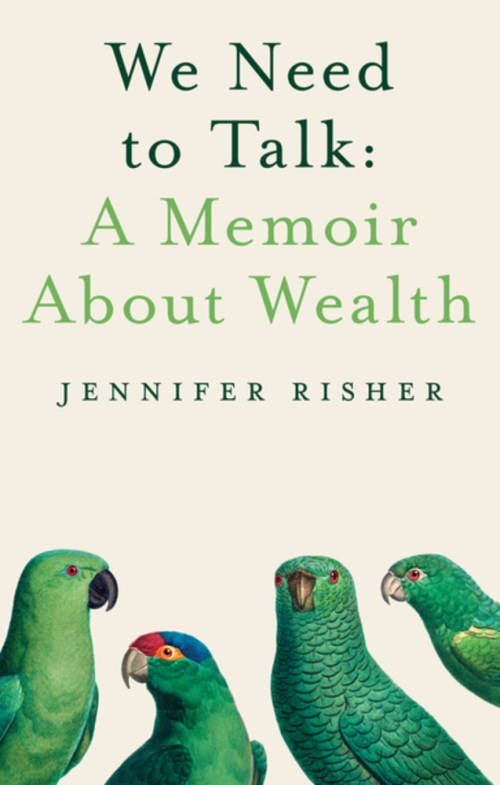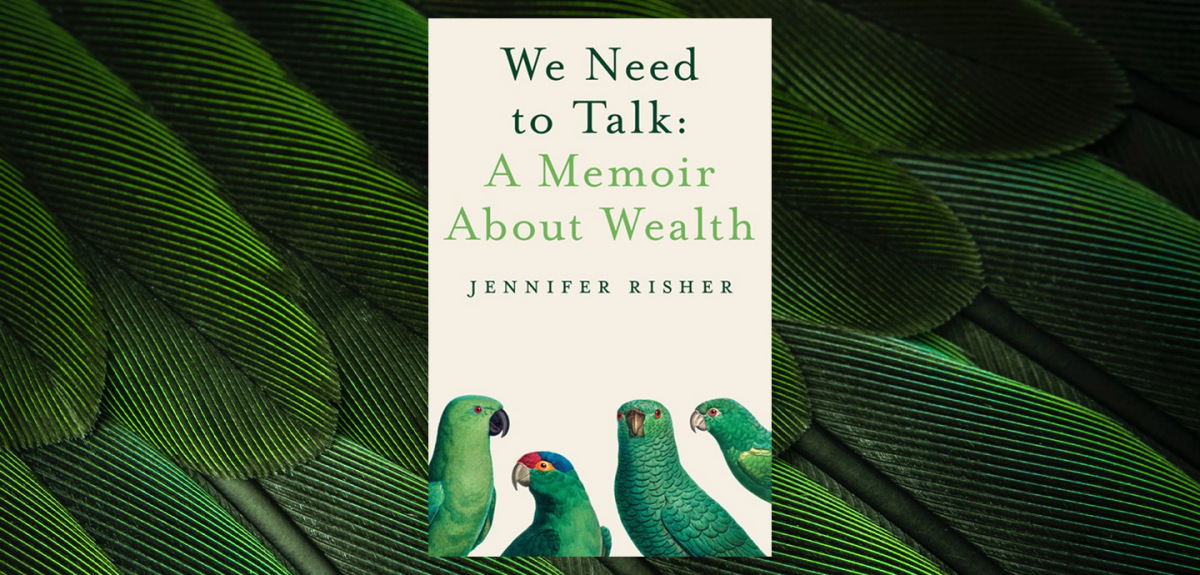[ad_1]
Inequality may be as old as human society, but never has it been this extreme, quantifiable and remediable. We’ve seen everyone from the Pope to Bernie Sanders to Thomas Piketty break it down. In meme-speak, guillotine GIFs have been proliferating on Twitter since 2016. But COVID-19 has made the message irrefutable. The fallout from the pandemic aligns neatly with income, with the most vulnerable facing the worst of it—not only illness and death, but also debt and poverty—even as tech fortunes skyrocket. In this context, Jennifer Risher’s We Need to Talk: A Memoir About Wealth, which details her transformation into a multimillionaire during the tech boom of the 1990s, is pitched as a “catalyst for conversation,” a tool for approaching issues surrounding wealth on a personal, rather than a systemic level. Through frank revelations about money and “how it makes us feel,” Risher hopes to “break down divides.”
A peek inside the world of the upper-stratosphere class is obviously of interest during this reckoning with the status quo. What to make of the tension between the utopian visions of tech entrepreneurs and their actual role in perpetuating inequality? Do super-rich people personally grapple with the ethics of holding a sizable chunk of humanity’s resources? Are they conscious of wealth as power to ensure a livable planet? And what are the limits of such philanthropy? As timely as these questions may be, regrettably, they are not discussed in this book. However, anyone who has suddenly come into several million dollars and is overwhelmed with the new pressures involved will want to drop this title in their Amazon cart.
Risher’s narrative details her journey from feeling uncomfortable with having and spending large sums of money to fully inhabiting rich as an identity, or in her own words, “doing rich my way.” This involves rejecting spending on outwardly splashy items like designer clothes, but allowing herself to indulge in endless remodeling of a second home in Napa Valley, and coming to embrace philanthropy as both a responsibility and “a joy.” The honest conversations about wealth referred to in the title are ones she wished she had had along the way, for example, about how to determine fair pay for household staff, plan vacations with less wealthy friends, deal with requests for loans, and ensure her children grew up with some sense of the real, laboring world outside of the bubble.
An indicative transformation is Risher’s attitude towards her diamond jewelry. She describes her own horror when she felt a persistent wish that her engagement ring had a bigger diamond, given the millions her husband-to-be had at his disposal. Many pages are spent on her struggle with the desire for “more sparkle,” and how she felt, on the one hand, that her new role as a millionaire demanded knowledge of such status symbols, and on the other hand, how she feared becoming materialistic. Risher later details the “clearer and more perfect” 1.5-carat diamond and the 3.5-carat solitaire her husband gives her on later occasions. “I was touched he’d played the knight, giving me a bauble fit for a princess,” she writes, “…But again, the real luxury was having David in my life.” The message is that she has come to appreciate that the relationship is more precious than any jewel, but the subtext is that she has also become a woman at ease around massive diamonds. Any doubts about what it means to spend tremendous sums on a “bauble” have evaporated, and the troubling issues with the diamond industry never come up at all.
Considering the memoir on its own terms, Risher’s sincere aim is to show that the super-wealthy aren’t that different from the rest of us, and that wealth can’t eliminate all of an individual’s “worries, insecurities, and limitations.” Raised in an upper-middle class household, Risher’s first job out of college was as a recruiter at Microsoft, where she quickly saw her stock options grow into the hundreds of thousands. Her wealth further multiplied, into the tens of millions, with her marriage to one of the builders of Amazon. While the memoir touches on major life events like marriage and the birth of two children, the more detailed episodes focus on defining moments in relation to her wealth. Risher contends that many of the problems she encountered as a rich person will be relatable to the non-wealthy. Anyone who has hired a babysitter, for example, will have wondered what is a fair wage. However, most interesting and most honestly considered are the entirely non-relatable questions she faces, notably the challenges of raising children under conditions of extreme wealth. These include deciding when to disclose to them just how wealthy they are, and whether and how much money to give them when they become adults.
Considering the book within the current political, economic and environmental context—which, given the pivotal nature of the present moment to the future of our species, seems appropriate, particularly if Risher’s stated aim is catalyze uncomfortable conversations about wealth—it’s worth asking what she brings to the debates convulsing every corner of the world. In fact, the book doesn’t entirely skirt politics. Risher states a couple of times that millionaires should be taxed more, that the government should “put a system in place that helps redistribute the wealth at the top to ensure food, education, healthcare, and housing for all,” but doesn’t recognize that she could play a role in that process. She details her evolution as a philanthropist, and how she developed a sense of which causes were important to her, like the nonprofit her husband founded to give people in the developing world access to digital books. There is also a single mention of Trump’s ascendance leading to more inequality in America, without reference to the response from the left.
The resounding message is that “we are all ninety-nine percent the same.” We need to “let go of the anger and resentment that divides us,” Risher contends, namely, the anger and resentment against the rich. She is unhappy about being lumped together with “people like” the Kardashians, who she disparages as “self-centered, materialistic, and always out for more” (apparently unaware of Kim Kardashian’s pursuit of criminal justice reform). “The phrase ‘the one percent’ has become divisive, fostering a sense of ‘us’ versus ‘them,’ blaming one socioeconomic group for problems created over years by a system that is no longer working,” she claims. This flipping of the Occupy Wall Street script is a disingenuous perversion of its primary message, which, by uniting most of humanity under the same metric—those living in one way or another on a fault line—is the opposite of divisive. If there is anything about this book that speaks to our current moment, it’s by example in reverse. We can’t depend on the interest, feelings, inclinations, or vanity projects of the super-rich, however well intentioned, to save us. By “save” I mean mitigate the acceleration of climate change, ensure all people’s basic needs are met, and now, adapt to the reality of a global pandemic. By “us,” I mean everyone living, in some way or another, on a fault line. The resources of ninety-nine percent of humanity should be enough to figure out collective ways to make these transformations; certainly it would be helpful if the additional one percent included itself in this effort.

MEMOIR
We Need to Talk: A Memoir About Wealth
By Jennifer Risher
Xeno Books
Published September 15th, 2020
[ad_2]
Source link
